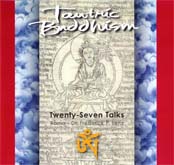
Tantric Buddhism
The Path of Negation
The path of negation is the path of understanding.
The path of affirmation, which is the first portion of the self-discovery path, is a path in which we don't seek to understand, we seek to escape. We want to escape the pain of life, the pain of our minds, the pain of our bodies, the pain of the world. We don't really want to ask a lot of questions; we just want to know a way out - and the way out is through avoidance. We don't eat meat, we don't have sex, we don't deal with money, we don't deal with things that we know have caused us pain. The great teachers explain why these things cause us pain - attachment, desire, having a self, you know, all the different things. But - we just escape. We don't really care. You go to the doctor and you hurt. You're not really interested in knowing how the medicine works, you just want it to.
When people seek the spiritual path - which is the path of affirmation, the exoteric path, the first path we walk on, the first part of the path - it's because they're in pain and they want to get away from the pain. So we have a series of prescriptions that we ask them to follow, which causes them to regulate their lives, to separate themselves from the things that cause them pain. The things that cause pain are desire, attachment, egotism, vanity - all the things that religious people tend to avoid.
Now, the avoidance of that which causes you pain does not produce enlightenment. It produces avoidance. The avoidance may lessen or tranquilize the pain, but it will not produce enlightenment. Knowledge and understanding produce enlightenment. Religion is the avoidance of pain and suffering, I mean symbolically, in the hope for a better afterlife, meaning one less painful than the one we're in. So if I don't do this and I don't do that and I do this and I do that, my next life, be it in heaven or another incarnation, will be better than this. In other words, it's all predicated on the avoidance of pain.
But the path of negation, which is the esoteric or more advanced part of the enlightenment process, is the path of understanding. It's the path of knowledge. Knowledge has nothing to do with avoidance or attraction. In our earlier understandings of life, we're bound by attraction, desire. We go after what we desire, and if we don't get it we're frustrated and unhappy. If we do get it, we're happy, maybe, for a short period of time - till the pleasure ends, till another desire comes and torments us. When it's fulfilled, our expectations were greater and we're frustrated because what we thought we would experience when this desire was fulfilled didn't come up to what we thought, and we're frustrated by that.
Human life is painful because of desire. We desire things and we chase after them. We're afraid of things and we run away from them. And somewhere between the desire and the aversion we exist as a self. The self can be measured by what it avoids and what it seeks and by its sense of history - past remembrances. That makes a self.

